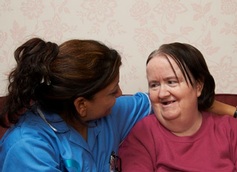Communication is key when specialising in Challenging Behaviour
Care providers need to prioritise communication skills in order to turn around the negative image that provision for adults with learning disabilities remains beset by, according to challenging behaviour experts.

Addressing a subject that has become a sensitive issue in recent years for the sector’s reputation, since the scandal of Winterbourne View was uncovered in 2011, Precious Homes Ltd business development manager, Emma Storrie, and Challenging Behaviour Foundation communications intern, Holly Dawson, share their expertise with carehome.co.uk on how providers can succeed in putting this negativity behind them.
Winterbourne View
Earlier this year the Department of Health acknowledged it had failed to meet its targets in moving adults with learning disabilities from inpatient care to community-based settings, one of the key aims of the Government’s ‘Transforming Care’ programme established in the wake of the Panorama documentary which brought the scandal into public awareness.
Difficulties with these forms of care have largely been responsible for damaging the public image of care services, the basis of far more examples of bad practice being reported than with, for example, older people’s care.
On challenging behaviour specifically, Precious Homes is the first provider to speak to carehome.co.uk on the task of carrying out this difficult form of care in a manner that contributes to the well-being of the individual.
Ms Storrie highlights some of the pitfalls services can succumb to, saying, “A common mistake some professionals can make during an individual’s transition is not monitoring and reading how well the individual is coping with new staff, new environments and new routines. This can only take place where professionals and others involved put aside set timescales, share each other’s knowledge and experience of the individual and take time to reflect and review how things are going for them.
“Transparency and joint-working between staff within current and new services is paramount in giving the individual the best chance to settle into their new surroundings and become happier and more independent over time.”
Restraint or non-restraint?
However, even if pitfalls are overcome, services still need to go one step further to ensure their provision is not merely adequate but greatly beneficial to those involved. Often one of the most difficult dilemmas is deciphering where restraint methods are necessary and what can be done to avoid them in the majority of situations.

Ms Storrie comments, “When individuals challenge during their transition, whether that be verbal aggression, physical aggression to themselves and/or others and their environment or disengagement and withdrawal, it is usually a sign that they are not feeling calm, comfortable and happy with changes around them.
“We operate using a non-restraint policy unless the individual and/or others are at significant risk of being harmed. We find that giving the individual space, time and consistent support and staff decreases stress and anxiety for the individual and increases the likelihood of them feeling accepted, trusting of staff and predicting what may otherwise be an unpredictable and chaotic new environment.”
Communication skills
In order to help each resident achieve a more stress-free daily lifestyle, Precious Homes favours combining a personal approach with specialist forms of communication, such as through sign language, artistic expression and innovative technology.
Ms Storrie says, “We also encourage the person to talk about what has or is upsetting them so that staff can better support the individual through their transition. All individuals communicate differently, therefore we encourage people that we support to use their preferred method of communication using verbal, British Sign Language, Makaton, drawing and art, written and the use of assistive technology. No matter what communication difficulties an individual may have, there are always ways to support the individual to play an active role in their transition, support planning and choice making.”
She continues, “There are no rigid right and wrong ways to support an individual through a transition, some individuals benefit from lengthy transition support, whereas others benefit from a short time of transition support.
“Flexible transition support has, however, proved to be positive and necessary for all of the individuals that we support across residential, supported living and independent living in the community. It significantly decreases stress and anxiety levels and increases engagement, skill developments and the likelihood of independence and confidence in the next stage of their life. Transition support is a priority that must be supported by all involved in an individual’s move.”
Speech and language
Holly Dawson, communications intern at the Challenging Behaviour Foundation, recommends that providers rigorously research this area of care and take advantage of speech and language studies especially.

She says, “Communication plays a vital role in good care and support. Many people with learning disabilities find communication difficult, or communicate in a different way to other people. It is therefore necessary that more of an effort is made to be perceptive of the wants and needs of people with learning disabilities, and to be aware of how these may be communicated. The Royal College of Speech and Language Therapists published ‘Five good communication standards’, which can be used by families, professionals and providers, so everyone knows what good communication is, and can recognise whether or not it is happening. Communication Passports are an excellent tool for ‘giving a voice’ to people who sometimes struggle to be heard, and include information on likes and dislikes as well as the best ways to interact with that individual.”
Another important factor is recognising each individual’s capacity for positive behaviour, even if their needs can be complex.
Ms Dawson continues, “A breakdown in communication can lead to behaviour that challenges. Given that communication is one of the most important ways in which we exert control over our lives, it is easy to understand how frustrating it must be for someone who finds communication hard when they feel they are not being listened to. Instead of labelling an individual as ‘aggressive’ or ‘challenging’, carers should think: What is the person trying to communicate? Are their needs being met? Has something changed in their environment? Are they feeling ill or in pain? This approach is in keeping with Positive Behavioural Support, which advocates creating pro-active plans for early recognition of distress and management of behaviour.”
Transition plans
In contrast with long-term disciplines, one integral factor for any successful care service to consider is that of transition. When there is upheaval in a person’s life, especially someone with sensitive mental health, then the likelihood of causing stress and unhappiness is always much higher if practice is not tailored to suit emotional state.
Precious Homes has ensured training and preparation is robust in this regard, understanding that a smooth transition reduces the likelihood of aggressive behaviour both in the short term and moving forwards.

Emma Storrie comments: “We are supporting an increasing number of individuals who have been discharged from secure units and hospitals under The Mental Health Act and in doing so we would like to highlight the importance of transition.”
Ms Storrie stresses that, “All individuals are different and require their own transition plan,” but considers the key components to a successful transition to include: clear communication with the previous provider, family, multi-disciplinary team and, most importantly, the individual; including the individual in their transition planning, if possible; learning from an individual’s previous unsuccessful transitions; maintaining an individual’s familiar structure and routine from previous to new home where possible; and realistic and fair timescales, allowing time for the individual to have days within their transition support where they find it too challenging to engage.
The Challenging Behaviour Foundation also stresses that the ability to control one’s own personal preferences should always be respected and supported within care practice as much as possible.
Ms Dawson comments: “People with learning disabilities whose behaviour challenges deserve the same things in life as everybody else, but they often need more support for this to be possible. This includes feeling empowered to live the life that they want, and being supported to make both everyday decisions and big life-changing decisions.”
Information sheets and services are available from the Challenging Behaviour Foundation website to help providers and loved ones: www.challengingbehaviour.org.uk
Latest Features News
 28-Nov-19
2019 Election: Labour pledges £10.8 bn for free personal care while Boris Johnson sidelines social care
28-Nov-19
2019 Election: Labour pledges £10.8 bn for free personal care while Boris Johnson sidelines social care
 18-Oct-19
Podcast: Wendy Mitchell and dementia: 'My biggest fear is not knowing who my daughters are'
18-Oct-19
Podcast: Wendy Mitchell and dementia: 'My biggest fear is not knowing who my daughters are'
 30-Sep-19
World's oldest diver aged 96 says 'never accept the fact you are getting old'
30-Sep-19
World's oldest diver aged 96 says 'never accept the fact you are getting old'
 27-Sep-19
Exclusive: Care minister backs care workers' call for time off to grieve and attend funerals
27-Sep-19
Exclusive: Care minister backs care workers' call for time off to grieve and attend funerals
 20-Sep-19
Podcast: Gyles Brandreth urges care workers to learn poetry with elderly
20-Sep-19
Podcast: Gyles Brandreth urges care workers to learn poetry with elderly